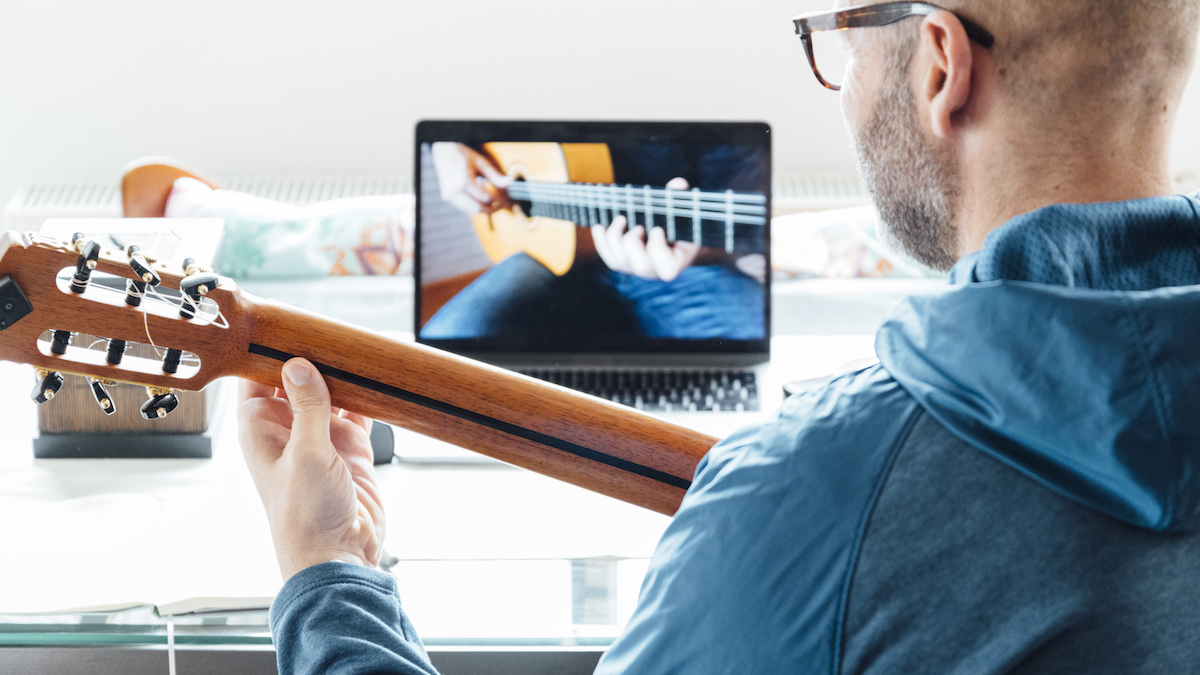Online guitar lessons vs face to face: which is right for you?
From cost and convenience to community and progress tracking, we weight up the pros and cons of both approaches to learning the guitar

Us learner guitarists have never had it as good as we do now. There are enough video lessons on YouTube to last anyone for, well, probably forever. Reputable online guitar lessons sites are plentiful in number. There’s a whole world of tutorial content that you can access using just your smartphone.
And, though learning guitar has been a little trickier lately for those who prefer their tuition face to face with a human, technology has been a saving grace, with video conferencing platforms helping keep students and teachers in touch.
Now, as pandemic restrictions begin to ease in many territories, getting together with a guitar teacher is something you might once again consider. But will you be spending your cash with a ‘real’ tutor? Or is the convenience of virtual lessons more of a draw to you? Both approaches have pros and cons after all.
Read on and we’ll look at some of these benefits and drawbacks. There’s no right or wrong here, but hopefully we’ll help you decide how to move forward with your own learning.
1. Cost

It’s a simple fact: in-person guitar lessons cost more than online tuition. You’ll pay between $80 and $230 for a year’s subscription to a service like Yousician, Fender Play, Pickup Music, TrueFire, Guitar Tricks, Orange Learn or JamPlay. And if that’s still too expensive, every site offers either a ‘lite’ free option or a full-featured trial period, so you can choose a platform before parting with your cash. According to Lessons.com, on average a 1 hour lesson will cost somewhere between $40 and $60 – and you can pay a lot more than that for in-demand teachers.
Of course, pro tutors can’t possibly compete with online subscription rates, but complimentary taster sessions, discounts for block booking and cost-sharing group lessons help keep in-person tuition affordable.
2. Benefits for beginners
If you’re just starting out on guitar, most online tuition sites have plenty of content for you. Notably, both Gibson and Yousician’s mobile apps offer an interactive experience, using your tablet/phone’s microphone to tell you in real time if you’re playing correctly.
Get The Pick Newsletter
All the latest guitar news, interviews, lessons, reviews, deals and more, direct to your inbox!
The Fender Play website features a clear, contemporary design, with a great course that’ll get beginners plucking, strumming and fretting with minimal fuss. Their site also includes a new ‘feedback mode’, currently in beta, that’s similar to Gibson/Yousician’s real-time interactivity.
The tech is exciting, but it’s something a human does better. The constant feedback from a qualified tutor helps beginners identify mistakes and correct them on the spot. No tutor? You risk ingraining ‘bad’ techniques that can hold you back, potentially for years. We’d recommend every beginner takes a few one-to-one lessons at the very least.
3. Convenience

Online tuition scores high for convenience. Of course it does – it’s the internet. You can access lesson content at any time, day or night, and hit rewind/play as many times as you need. Still, private tutors are keen for your business and you can expect them to try to be as flexible as humanly possible. Many offer home visits and, since the start of the global pandemic in 2020, lessons via Zoom have become increasingly popular (and higher tech).
If you’re studying for guitar grades with a tutor, it’s worth noting that some providers such as Online Music Exams have begun to offer their exams digitally too. You really can achieve a lot from the comfort of your living room, whichever approach to learning you prefer.
4. Community activities

Some private guitar tutors, particularly those with long rosters of students and larger teaching spaces, organize regular group concerts and social events. You can develop live performance skills, learn more about your gear and build your confidence and stagecraft, all while making new friends and having fun. Ask in your local guitar shop – they’ll probably know someone.
Not to be outdone, most tuition websites have some kind of community offering too. Guitar Tricks has a substantial online forum where students can chat about their progress, and TrueFire has a public Facebook group for students. Online or offline, there’s plenty to choose from.
5. Quality of teaching materials
Online tuition sites offer more facilities than ever before. For instance, TrueFire’s video lessons are time-stretchable and include guitar tab that tracks along with the video at your chosen playback speed. You can loop sections, select fullscreen or side-by-side view and download content to desktop or mobile platforms.
As regards in-person lessons, most tutors have their own teaching materials and technology, including tab/notation software such as Guitar Pro or Finale. Many will be happy for you to record your lessons to refer back to, either live in the room or via Zoom. And no online platform can create a bespoke lesson on the spot based on a question you ask them. You definitely need a teacher for that!
6. Personalities

YouTube’s content creators range from beginners who’ll show you what they’ve just learned, right up to pro-level player/videographers offering virtuoso tuition. For general tuition, we recommend following well-known popular tutors such as Justin Sandercoe, Andy Crowley or Marty Schwartz, who offer a wealth of free material, as well as some paid for content.
If you’re considering face to face tuition, it’s important that you get on well with your teacher. Many tutors rely on word of mouth for their business, so a recommendation from a guitar-playing friend is well worth following up on.
7. Progress tracking
If you opt for freebie YouTube content, you’ll be the sole judge of your progress, but you’ll see best results if you follow structured lesson content and receive regular feedback. Some sites allow you to ‘mark as complete’ each lesson as you go, which is useful but rudimentary. Make sure to use the more interactive facilities on offer, such as Gibson, Yousician and Fender Play’s real-time jamming features and JamPlay’s live Q&A tutor sessions.
Perhaps inevitably, in-person tuition is a clear winner for tracking your progress. A good teacher will ensure you end every lesson with a practice plan to see you through till your next session.
8. The masterclass model
If you want to learn from famous guitarists, TrueFire has a huge selection of courses presented by big name players. Pickup Music is much smaller, with only a few star tutors, but it’s a cool site with a youthful vibe and it’s growing. However, global pandemics notwithstanding, masterclasses are not restricted to the internet.
If you prefer your masterclasses in person, there are a raft of companies that cater for you. In the US, Guitar Workshop Plus organizes week-long workshops, complete with visiting world-famous guitarists. In the UK, Guitar Breaks offers bespoke courses with pro tutors and star guitarists alike, and IGF hosts an annual guitar summer school featuring some of the country’s best known guitar teachers. There’s certainly a cost consideration here, but there’s something for everyone if you’ve got the coin.
9. How much will your playing improve?

This is the $64,000 question and answering it depends on what you want to achieve with your playing. In-person lessons with a qualified tutor are bespoke to your needs, so your progress can be fast-tracked and you’ll nip technical errors in the bud quickly. If you’re having weekly lessons, it’s worth committing to a few months’ worth to really get the best results.
Conversely, sites like Fender Play help beginners cover the basics, but without the forensic feedback of a private tutor, so your progress may vary. TrueFire offers zillions of short- and medium-length lessons and courses and there’s a bit of a ‘pick and choose’ vibe, as if the site were your own vast private library.
Ultimately, you get out what you put in, whatever kind of lessons you choose, but there’s no substitute for being in the room with someone who can direct you in person. With a good tutor you’ll always be on the right track.
Related buyer's guides
Chris has been the Editor of Total Guitar magazine since 2020. Prior to that, he was at the helm of Total Guitar's world-class tab and tuition section for 12 years. He's a former guitar teacher with 35 years playing experience and he holds a degree in Philosophy & Popular Music. Chris has interviewed Brian May three times, Jimmy Page once, and Mark Knopfler zero times – something he desperately hopes to rectify as soon as possible.
“There are so many sounds to be discovered when you get away from using a pick”: Jared James Nichols shows you how to add “snap, crackle and pop” to your playing with banjo rolls and string snaps
Don't let chord inversions bamboozle you. It's simply the case of shuffling the notes around










